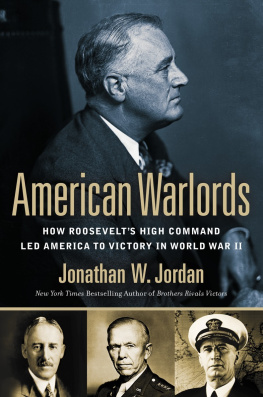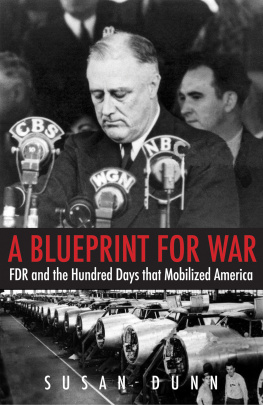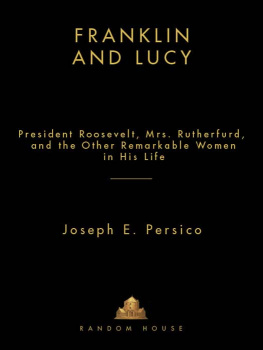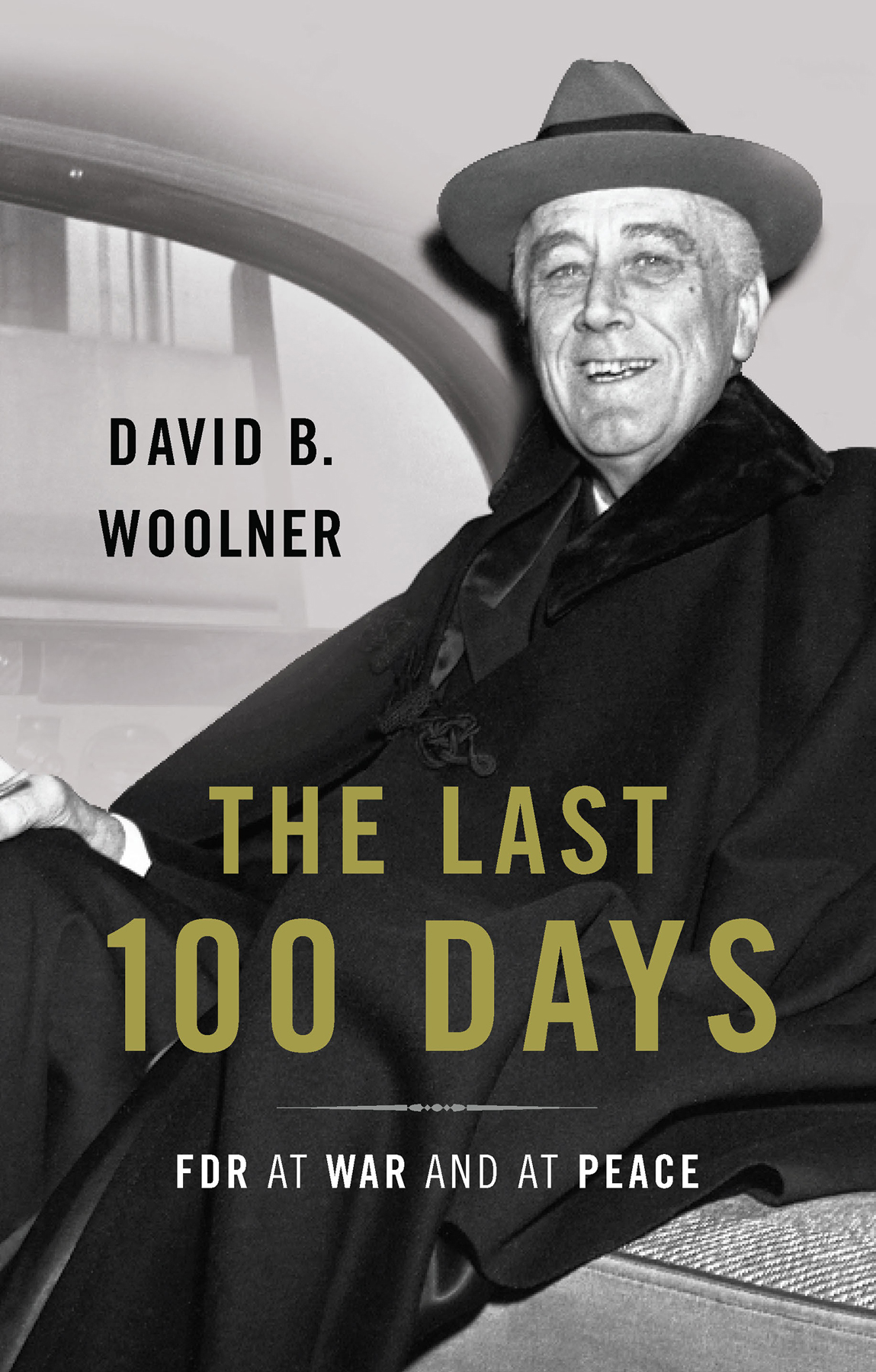Copyright 2017 by David B. Woolner
Published by Basic Books, an imprint of Perseus Books, LLC, a subsidiary of Hachette Book Group, Inc.
All rights reserved. Printed in the United States of America. No part of this book may be reproduced in any manner whatsoever without written permission except in the case of brief quotations embodied in critical articles and reviews. For information, address Basic Books, 1290 Avenue of the Americas, New York, NY 10004.
Books published by Basic Books are available at special discounts for bulk purchases in the United States by corporations, institutions, and other organizations. For more information, please contact the Special Markets Department at the Perseus Books Group, 2300 Chestnut Street, Suite 200, Philadelphia, PA 19103, or call (800) 810-4145, ext. 5000, or e-mail special.markets@perseusbooks.com.
A catalog record for this book is available from the Library of Congress.
In this magisterial account, David B. Woolner makes a compelling case that FDRs last hundred days deserve to be ranked in importance with the first. Drawing on unequalled knowledge of both Roosevelt and the sources, Woolner refutes the notion of a feeble dying president who had lost his grip and was unwilling to confront difficult issues. He shows that an exhausted FDR conserved his limited energies single-mindedly to concentrate on the two most important issues facing the presidentwinning the war over the Axis powers and securing postwar international cooperation. A wonderfully lucid and convincing study.
Anthony Badger, author of FDR: The First Hundred Days
At a time when a majority of Americans are so disillusioned about politics, and with a sitting president under investigation for possible impeachable offenses, Woolners book offers a compelling look at a great chief executive. His portrait of FDRs last hundred days is a powerful reminder of courageous leadership and provides hope that we can return to presidential effectiveness in the not-too-distant future.
Robert Dallek, author of Franklin D. Roosevelt: A Political Life
Franklin Roosevelts last hundred days were every bit as fascinating and consequential as his first. If you want to know how much of the modern world came to be, this is the place to begin.
Geoffrey C. Ward, author of A First-Class Temperament: The Emergence of Franklin Roosevelt
The Last 100 Days is an imaginative, deeply researched page-turner that is a pleasure to read. At a time when many Americans find the White House desolating, Woolner invites the reader to enjoy some time with a president who, even in his final year, radiated good cheer and hope for our countrys future.
William E. Leuchtenburg, author of Franklin D. Roosevelt and the New Deal, 19321940
Woolner has hung around with FDR for over a quarter-century, and we are the beneficiaries of that special relationship. Neatly using the last hundred days as a vehicle for a broader assessment, Woolner has given us an honest, solidly researched appreciation of Roosevelts dreams and actionsdreams and actions that shaped the remainder of the twentieth century.
Warren Kimball, author of Forged in War: Churchill, Roosevelt, and the Second World War
IN MEMORIAM
Lewis B. Woolner, 19132016
That we shall die, we know; tis but the time And drawing days out, that men stand upon.
Julius Caesar, Act III; Sc. 1
F RANKLIN D ELANO R OOSEVELT IS CONSISTENTLY RANKED AS AMONG the most important and effective chief executives in American history. For most historians the two most significant aspects of his presidency remain the unprecedented nature of his response to the Great Depression and the skillful leadership he exhibited in the summer of 1940, when he made the critical decisionat great political riskto stand behind Great Britain in the twelve perilous months following the defeat of France in June 1940.
It was to meet the first of these catastrophes that FDR launched his famous first 100 days, a period of just over three months in which Congress under FDRs leadership passed an extraordinary fifteen major pieces of legislation. Many of the provisions enacted during this frantic periodincluding the establishment of the Federal Deposit Insurance Corporation and the requirement for transparency in the sale of securitiesare with us still. So, too, are several subsequent provisions of the New Deal that FDR promised the American people when he first ran for the White House, such as Social Security, unemployment insurance, and the right of workers to form unions and engage in collective bargaining. The social and economic safety net provided by these programswhich were designed, as FDR said, to lessen the hazards and vicissitudes of lifefundamentally changed the nature of the relationship between the American people and their government.
These achievements alone are enough to render FDR among the significant of our nations presidents. Yet he faced a growing international crisis that reached its climax less so with the German attack on Poland in
But FDR did not agree and, despite the fact that 1940 was an election year, resolved to support Prime Minister Churchills determination to fight on. The first manifestation of this support came in the form of an Anglo-American agreement to ship fifty mothballed US World War I destroyers to Britain, followed by secret staff talks among senior members of the British and American armed forces, an increased number of US naval patrols in the Atlantic, and, in March 1941, passage of the Lend Lease Act, which solidified Americas role as the great arsenal of democracy.
As with FDRs decisive response to the economic crisis he inherited in 1933, and his response to the fall of France, the role he subsequently played in crafting the Grand Alliance that would go on to defeat the Axis is likewise viewed as one of his crowning achievements. But to FDR, winning the war was never enough. Convinced that the global economic hardship of the 1930s was what gave rise to fascism in Europe and Asia and sent the world spiraling toward war, he foresaw that the United States had to fashion a new postwar order out of the ruins of the present conflict. This conviction underlay his January 1941 articulation of the Four Freedoms and the crafting of the Atlantic Charter eight months later. In short, FDR had committed himself to the establishment of a new system of international securityas called for in the last clause of the Chartereven before the United States entered the conflict. He never lost sight of this overriding ambition and, in spite of what Frances Perkins called his transcending preoccupation with the day-to-day demands of the war, always considered how each victory could be woven into a pattern of permanent peace and world organization.
To a certain extent, this focus on victory and the management of the war obscured FDRs determination to use the conflict as a catalyst for the establishment of a new postwar order centered on the creation of the United Nations. There is irony in this comment, for what also makes FDRs tenure in office uniqueaside from his election to four terms and the fact that he remains our only wheelchair presidentwas his willingness to hold two press conferences per week for virtually his entire tenure in office, meaning that by the time he died in April 1945 he had held a stunning 998 meetings with the press.






